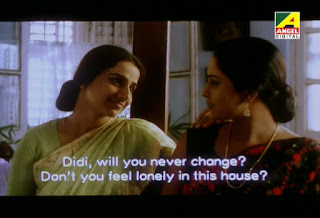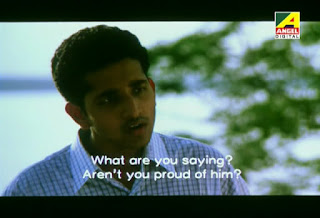The film starts out with an extended shot of Buri (Vidya Balan) standing outside in a rainstorm drenched and smiling from all the senses she is experiencing. Later, we see a flashback of Buri as a child lost in a busy carnival. These flashbacks happen quite a bit in the film, and after I while I got confused which scenes were in the present day and which in the past. Then we begin to understand more of Buri’s life and past- multiple family members who died, her boyfriend who left her… yet through all of this she has a quiet strength that keeps her going. I found it kind of annoying, actually, because I never understood where her restrained Pollyanna-syndrome came from.
It sounds like a depressing film, but it didn’t have a heavy atmosphere like other Bengali films I’ve seen. Most things we simply hear about or are shown very briefly. There is this palpable sense of a general malaise among the characters in the film, but its not thick and overtly tragic. The characters just keep going, especially Buri. I sensed that she was supposed to represent something in the film, almost metaphorically, as if she was the bedrock for her family or perhaps a symbol of freedom from pain and desire in life. There were also many scenes of spoken poetry by various characters, and one at the end regarding the tree seemed to have complex meaning. But I am not a deep person in this regard, so who knows. You can read the following reviews which wax eloquent about the apparent symbolism in this film, but I don't get it: The Telegraph, Screen Weekly, Life and Buddhism blog.
The central problem I had with the film is that I wasn’t given enough background on the characters for me to care about them. I often felt really confused at what was happening. I didn’t understand the political movement that some of her family members “joined” that caused them such unhappiness. All they did was talk about it briefly- we never see any of their meetings or any activities other than some conversational mentions of “fascism” and a Che Guevera poster and mention that the police have come. Because of this, I was left perplexed when a character was murdered because of the apparent connection to a political group. There were also some random scenes that seemed to add nothing to the story, and a lot of focus was put on everyday shots of people walking around, looking, thinking, etc.
I had an extremely difficult time figuring out everyone’s names and who they were related to, which is probably because I don’t know Bengali. The subtitles often translated things as “brother” or “sister” which could have been literal, pet names, or simply names of respect. I think adding “di” or “da” to the end of someone’s name denoted sister or brother, respectively, in Bengali. Vidya Balan's character was often called "Buri'di," so I assumed her named was Buri, but other reviews call her Anandi so who knows!
I thought Vidya Balan acted wonderfully here. From what I’ve read, this was her very first film in any language. She completely inhabits the quiet and gentle nature of her character, and her acting is so seamless you don’t notice it. Her facial expressions, such as the looks she gives to others as she listens to them or while she walks through her room alone, seemed completely real and believable.
Parambrata Chatterjee, whom I had seen previously in the Bengali film Aamra, is so adorable to me. Here he plays a nerdy young man who is made fun of by his family, which is quite the opposite of his character and appearance in Aamra.
I will say that the film is nicely shot with its focus on water, moisture, and nature throughout, though it was limited by the poor DVD quality. I had the Angel Digital version from Induna.com, which unfortunately has the logo plastered on the top-right part of the screen and “burned” subtitles on the print in hard-to-read white font color.













This comment has been removed by the author.
ReplyDeleteApologies, same post as above, just using my wordpress ID, instead of google.
ReplyDeleteHow can she feel lonely, when there are so many chores? Wow, that is the statement of a seriously repressed person, or someone who is in complete denial. From your description, it sounds as though there was a lot of assumptions about what the viewer had knowledge of, as well as unspoken truths that accompany the reality of her life. This is a main reason that I have started reading up on the politics and culture, it is integral in every Southie film, and subtitles will never catch all of the nuances.
I think you're right about there being a lot expected of the viewer of this film. I keep reading that a lot of Bengali films are based on novels as West Bengal has quite a great literary tradition. I can't remember if I read that this is true for Bhalo Theko, but it would probably explain why I found it so confusing. Maybe Bengalis watching this film already knew about the characters from a well-known novel.
ReplyDeletehi
ReplyDeleteits nice to know a person somuch intrested in indian classical dance iam from india from telugu iam also intrested in classical dance iha some books and a research manual of 1965 if u intrested contace me tsrinivas3@hotmail.com
i agree with the review as i am also a non-bengali.The movie seemed to be confusing n little depressing.But through out the film, the beauty of Nature was uplifting.At the end..poetry to me was like...an answer to all questions or notions arose in my mind..it was like forget all sorrows of this world(depression),don't dwell too much on mysteries of life(confusion)...after all... Nature(Supreme Love) is forever yours
ReplyDeleteThe movie is about the definition of happiness. To some happiness is about dharma, righteousness and to others, the majority, it's about short term fun in any way. She stood for the first group of people. And she stood tall. But people around her and specially her lover fell short of that depth. He was the first and last straw in her life. Long story short, the story is about the loneliness of being different in this world of populist culture. It doesn't make any bones about it
ReplyDeleteDear Ms Cassidy,
ReplyDeleteGreetings. While going through the contribution of late Mr.K.V.Mahadevan, on some of the rare compositions of south Indian film music may be 50 to 80 years back in time to add to my collection of listening to music while at work, I came across your blog. Well, if you are interested I will share some of the rare video links contributed by a number of well-wishers in South India on old film songs, I located in internet. I do this systematically to share with some of my friends who are deep into music and sing as well but my skills are limited to my listening and appreciating only. Commercialization is a strict no for me. Internet has really removed that commercial lock. I pray to Goddess Saraswathi to bless you with more innings and sharing and pairing.
Hari Om